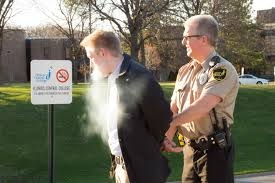FAQs
The following list of questions and answers were written in response to questions the tobacco-free taskforce has been asked directly or indirectly through the 30 day policy comment period. If you have a question that is not reflected below, please submit it by contacting a member of the taskforce.
Q: When did the new policy go into effect?
A: June 1, 2014
Q: Why did EKU go tobacco-free?
A: The University seeks to provide a clean and healthy environment for all students, employees and visitors. A tobacco-free campus policy will protect everyone from second-hand smoke. Eliminating tobacco use will also keep our campus beautiful.
Q: To whom does the tobacco-free policy apply?
A: The tobacco-free policy will apply to every person on EKU’s campus, including students, faculty, staff, visitors, volunteers, contractors and service representatives.
Q: What types of tobacco or similar products are included in the policy?
A: The use of all Tobacco (cigarettes, cigars, pipes, water pipes/hookah, electronic cigarettes (e-cigs), and smokeless tobacco products – snuff, chewing tobacco, and dipping tobacco) will be prohibited on EKU campus.
Q: Can I smoke inside my own vehicle?
A: Smoking on all EKU property, including inside a vehicle, is prohibited.
Q: Will there be designated smoking areas on campus?
A: No. The goal is to avoid secondhand smoke for all of the EKU community, not just in designated places.
Q: What about football games or other public events?
A: All events occurring on campus or on campus-property will be covered by the tobacco-free policy.
Q: Why does the proposed policy include smokeless tobacco?
A tobacco-free policy sends a consistent health message by not implying that smokeless forms of tobacco are safe. There are no safe forms or levels of tobacco use. The policy promotes and protects the health of all campus members, users and non-users alike.
Q: Why does the proposed policy include e-cigarettes?
Electronic cigarettes have not been approved by the FDA for cessation. On April 25, 2011, the FDA announced that e‐cigarettes will be regulated as tobacco products. National health agencies remain skeptical of the safety of these devices due to a lack of scientific data. Until and unless the FDA approves a specific e‐cigarette for use as a tobacco cessation aid, these will not be allowed on campus, which is consistent with national standards and guidelines.
Q: Is EKU requiring that people stop smoking?
A: No. This policy simply means that no one can use tobacco products while on Eastern’s campus.
Q: What resources are available for employees who want to quit smoking?
A: EKU continues to provide free nicotine replacement and behavioral support for students, employees and spouses, sponsored dependents and dependents 18 years of age and older who are covered under EKU health insurance.
Q: Have other universities implemented similar policies?
A: On June 1, 2014 Eastern Kentucky University joined over 1,182 college and university campuses who have successfully gone smoke free. In Kentucky, 17 universities and colleges have implemented 100% smoke-free policies.
Q: Are students and employees supportive of a tobacco-free policy?
A: According to an EKU campus-wide tobacco survey conducted in spring 2014, 64 percent of respondents believe adopting a tobacco-free policy would be beneficial.
Q: Isn’t it my right to use tobacco?
A: Tobacco use is a legal product for adults. However, the university owns the campus property and can establish policies that protect the health of all campus members. Furthermore, according to the Public Health Institute, “no court has ever recognized smoking as a protected fundamental right nor has any court ever found smokers to be a protected class.” As long as tobacco regulation is created on the basis of a legitimate government objective, like public health or the environment, it will always be upheld as constitutional.
Q: I am interested in helping with tobacco-free efforts on campus. Who should I contact?
A: Contact any member of the tobacco-free taskforce.

